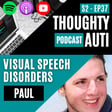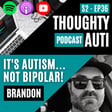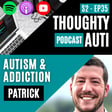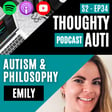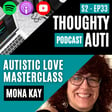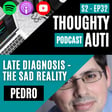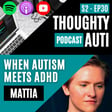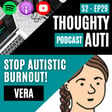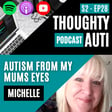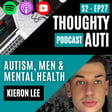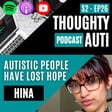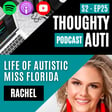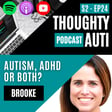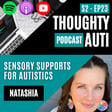
Autism Gaslighting and Mate Crime
What does intentional and unintentional gaslighting look like for Autistic people? Why is Mate Crime such a big problem for us? What are some neurodiverse relationship green flags and red flags?
Joely Williams (@joelywilliams_myautisticwings) is a physically disabled Autistic speaker and author based in the UK. Diagnosed Autistic at 2 years old, but only aware of her neurodivergence at age 13, she speaks on lesser-known aspects of Autism and mental health from her own lived experience and knowledge as an Autistic woman.
My Links - https://linktr.ee/thomashenleyUK // Joely’s Website - www.myautisticwings.co.uk
Dbud Noise Cancelling Adjustable Ear Buds (20% Off with code: THOUGHTYAUTI) - https://dbud.io/thoughtyautipodcast
Breaking the ice, Thomas and Joely talk about their experiences with music therapy, nightlife, and music festivals as Autistic people. Joely describes herself as a strange mix of sensory seeking and sensory avoidant behaviours, feeling comfortable moshing it up with the best of them, but often feeling sensitive in other situations.
Joely explains the concepts of intentional and unintentional gaslighting, at worst being a manipulative tactic or at the least an unhelpful reality-denying series of comments. Joely highlights that unintentional gaslighting often has good intentions, but can often be ableist in nature when thinking about Autistic people in teaching or parenting contexts; denying the utility of stimming or highlighting sensory issues as 'not too bad' being too prime examples of unintentional gaslighting.
Infantilisation and stereotyping seem to be two common ways people gaslight autistic people. Those infantilising autistic people might paint them as children to deny their comments or opinions, or even enforce unwanted care on them. When stereotyping they may highlight things around empathy or social incompetence as a means for manipulation.
Speaking on the reasons why Autistic people may be more prone to gaslighting, direct communication preferences, Alexithymia, mental illness, and prior negative conditioning are all highlighted. Joely describes the Autistic mind as processing facts first, meaning that it may take some time to process the context or social indirect communication around a statement. Alexithymia may make it more difficult to set immediate boundaries and mental illnesses like anxiety, prior invalidation of our experiences in youth, and bullying would definitely contribute to our lack of belief in our own experiences,
Mate Crime is where someone takes advantage of a vulnerable person in order to extract monetary or intimate benefits from the individual or to humiliate and gain control over a person. Whilst being against the law, it's incredibly difficult to prove and takes advantage of a person's loneliness and isolation.
Going through t






